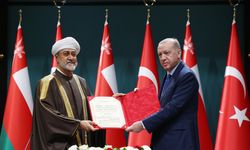Today marks the 20th anniversary of Türksat, Türkiye's pioneering entity in the realm of space technologies.
Established on July 22, 2004, Türksat has played a pivotal role in advancing the country’s capabilities in this field.
The roots of Türksat, now a recognized global brand, extend back decades. The journey began in 1968 with the formation of the Peyk (satellite) Telecommunications Group Chief Engineering under the PTT General Directorate. Over the years, satellite and related services evolved, eventually transitioning to Türk Telekomünikasyon AŞ, established on April 24, 1995. Subsequently, on July 22, 2004, Türksat AŞ was established to oversee satellite communication services, solidifying its position as a leader in the sector.
With the establishment of Türksat, Türkiye made rapid progress in space, satellite and related fields;
• Türkiye's first communication satellite, Türksat 1B, was launched on Aug. 11, 1994.
• Türkiye's second communication satellite, Türksat 1C, was launched on July 9, 1996.
• On Jan. 11, 2001, the Turksat 2A satellite was launched into space.
• On June 13, 2008, the Türksat 3A communication satellite was launched into space.
• On April 26, 2013, Türkiye’s first domestically designed and built low-orbit communication satellite, Türksat-3USAT, was launched into space.
• On Feb. 14, 2014, the Türksat 4A communication satellite was launched into space.
• On Oct. 16, 2015, the Türksat 4B communication satellite was launched into space.
• On Jan. 8, 2021, the Türksat 5A communication satellite was launched into space.
• On Dec. 19, 2021, the Türksat 5B satellite was launched into space.
• Türkiye's first domestic and national communication satellite, Türksat 6A, was launched into space on July 9, 2024.
With the launch of Türksat 6A, Türkiye joins a select group of 11 countries capable of manufacturing communication satellites. This achievement marks a significant milestone in reducing dependency on foreign satellite technology.











